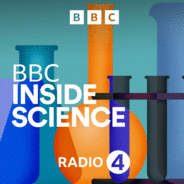COP 30 delegates from around the globe are about to depart the Amazon city of Belem in Brazil. But not before some very important documents are drawn up. Camilla Born, former advisor to Cop 26 president Alok Sharma speaks to Tom Whipple about the scientific significance of the language negotiators choose to use. And it’s the eve of The Ashes. As England Men’s Cricket Team line up against their Australian counterparts in Perth, cricket fans on both sides will be hoping for sporting records to fall. But is breaking those records getting increasingly less likely? And can some maths explain all? Tom asks Kit Yates, author and Professor of Mathematical Biology and Public Engagement at the University of Bath.Plus science broadcaster Caroline Steel is in the studio to discuss this week’s brand new scientific discoveries. If you want to test your climate change knowledge, head to bbc.co.uk search for BBC Inside Science and follow the links to The Open University to take the quiz. Presenter: Tom Whipple
Producers: Jonathan Blackwell, Ella Hubber, Tim Dodd, Alex Mansfield and Clare Salisbury
Editor: Martin Smith
Production Co-ordinator: Jana Bennett-Holesworth

Wissenschaft & Technik
BBC Inside Science Folgen
A weekly programme that illuminates the mysteries and challenges the controversies behind the science that's changing our world.
Folgen von BBC Inside Science
641 Folgen
-
Folge vom 20.11.2025What’s in the wording of the COP 30 negotiations?
-
Folge vom 13.11.2025Could technology replace animal testing in science?This week the UK government set out its vision for a world where the use of animals in science is eliminated in all but exceptional circumstances. Animal experiments in the UK peaked at 4.14 million in 2015 driven mainly by a big increase at the time in genetic modification experiments. By 2020, the number had fallen sharply to 2.88 million as alternative methods and technologies were developed. But since then that decline has plateaued. Could we see the end of animals being used in science labs? Presenter Tom Whipple is joined by Dr. Chris Powell, Director of Cambridge BioPharma Consultants Ltd. and honorary visiting scientist at Cambridge University and Dr. Natalie Burden, head of New Approach Methodologies at the National Centre for the Replacement, Refinement and Reduction of Animals in Research (NC3Rs). And as world leaders gather for the COP30 climate conference in Brazil, we speak to glaciologist Dr. Matthias Huss. In the past decade, his data has shown that a quarter of Swiss ice has been lost, with hundreds of glaciers having disappeared entirely. But part of one of those glaciers remains in the freezer of his basement... Also Penny Sarchet, managing editor at New Scientist, brings us her take on the new science that matters this week. To discover more fascinating science content, head to bbc.co.uk, search for BBC Inside Science and follow the links to The Open University. Presenter: Tom Whipple Producers: Clare Salisbury, Tim Dodd, Alex Mansfield, Jonathan Blackwell Editor: Martin Smith Production Co-ordinator: Jana Bennett-Holesworth
-
Folge vom 06.11.2025Is Dark Energy Getting Weaker?Astronomers have new evidence, which could change what we understand about the expansion of the universe. Carlos Frenk, Ogden Professor of Fundamental Physics at Durham University gives us his take on whether the dark energy pushing our universe apart is getting weaker.With the Turing Prize, the Nobel Prize and now this week the Queen Elizabeth Prize for Engineering under his belt, Geoffrey Hinton is known for his pioneering work on AI. And, since leaving a job at Google in 2023, for his warnings that AI could bring about the end of humanity. Tom Whipple speaks to Geoffrey about the science of super intelligence. And Senior physics reporter at Nature Lizzie Gibney brings us her take on the new science that matters this week.To discover more fascinating science content, head to bbc.co.uk search for BBC Inside Science and follow the links to The Open University.Presenter: Tom Whipple Producer: Clare Salisbury Content Producer: Ella Hubber Assistant Producers: Jonathan Blackwell & Tim Dodd Editor: Martin Smith Production Co-ordinator: Jana Bennett-Holesworth
-
Folge vom 05.11.2025Is climate change to blame for Hurricane Melissa?What’s been called the storm of the century - Hurricane Melissa – has barrelled through Jamaica, Cuba, and the Bahamas over the past two days. Hannah Cloke, Professor of Hydrology at the University of Reading, explains whether Melissa was caused – or made worse - by human-made climate change. As the H5N1 bird flu season picks up across British farms, virologist Ian Brown from the Pirbright Institute assesses its threat and turns our attention to a largely ignored strain of bird flu – H9N2 – which a recent study suggests is becoming adapted to human cells. The interstellar comet 3I/Atlas has inspired some bizarre theories about alien life coming into our solar system. BBC science journalist Roland Pease, who has been watching these cosmic events and the pseudoscientific myths that follow in their wake for decades, gives us his take. And mathematician Katie Steckles brings us her favourite finds from the world of science.If you want to test your climate change knowledge, head to bbc.co.uk search for BBC Inside Science and follow the links to The Open University to take the quiz.Presenter: Victoria Gill Producers: Ella Hubber, Jonathan Blackwell, Tim Dodd Editor: Martin Smith Production Co-ordinator: Jana Bennett-Holesworth
